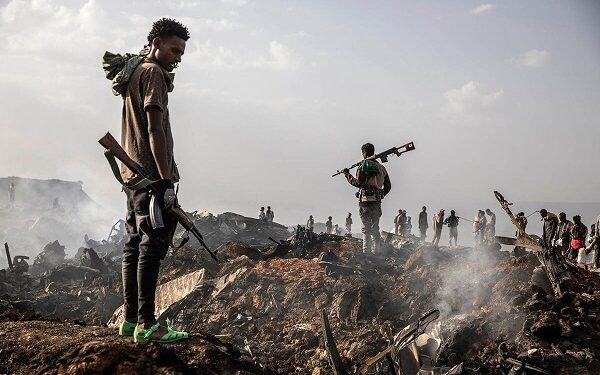ADDIS ABEBA, Oct 30 (The African Portal) – As tensions rise once again, Ethiopians and the world must act now to stop another tragedy that is low-key ongoing. Ethiopia stands once more at a dangerous crossroads. The memory of the recent war is raw in the Tigray region while the conflict is still raging in the other regions of Ethiopia. Families are still healing, and communities are still hoping for rebuilding, yet the sounds of violence are still roaring in another corner of the country. It’s heartbreaking that a country so rich in history, courage, and culture finds itself again facing the vicious cycle of war. Ethiopia deserves peace. Its people deserve a future not defined by loss. Every delay, every broken promise, and every ignored warning brings Ethiopia closer to collapse.
The Oromia and Amhara regions, two of Ethiopia’s largest and home to nearly two-thirds of the country’s 130 million people, are today major conflict hotspots, owing to ongoing hostilities involving Fano and the Oromo Liberation Army (OLA), as well as the federal government. Meanwhile, the Tigray region, where a brutal two-year war claimed more than 600,000 lives, is now facing renewed turmoil, with growing concerns that the conflict could flare up again.
The country has paid a painful price from these conflicts already. As per UNICEF, eight million children (49 percent girls) are out of school, mainly in the Amhara, Oromia, and Tigray regions, with more than 9,654 schools damaged due to conflict. In 2022, the Ministry of Health reported that conflict-related damage to health infrastructure across the country amounted to 1.4 billion birr.
There are also well-documented reports of mass rape, forced pregnancy, and sexual torture committed by parties to the conflict—acts that have inflicted severe and lasting health consequences on survivors, many of whom will carry the physical and psychological scars for the rest of their lives. Beyond the human toll, the conflicts threaten to saddle the nation with a crushing debt burden, potentially shackling its economy for years to come.
Each delay and broken promise is not just a setback; it is another step toward Ethiopia’s potentially bigger crises. Accusations fly between leaders instead of dialogue. Recent fighting around the city of Woldiya reignited tensions and accusations that the Tigray forces and Eritrea might have been involved alongside Fano. Ethiopia’s push for sea access has further strained relations with Eritrea, raising fears of yet another regional war.
Crossroads of Conflict: Ethiopia faces escalating crisis
Ethiopia’s troubles did not appear overnight. They are rooted in years of mistrust, political exclusion, and deep divisions. Federalism, once meant to protect diversity, has too often hardened the lines between communities. A “winner-takes-all” political culture leaves no room for compromise. The recent election and political dispensations are excellent examples here. Population growth makes scarce resources even harder to share, as we have seen time and again in inter-ethnic conflicts around pastoralist communities. History filled with pain and pride continues to be used by some politicians as a weapon rather than a lesson.
The 2022 Pretoria Agreement between the federal government and the Tigray People’s Liberation Front (TPLF) promised hope after the devastating Tigray war; while it is praiseworthy for silencing the guns in Tigray, its promises remain largely unfulfilled. Tanzania peace talks facilitated by the U.S., IGAD, Kenya, and Norway between OLA and the federal government were left in vain despite public commitment to continue talking by both parties.
Today, persistent violence in Amhara and Oromia has led to the breakdown of public services and the mass displacement of communities. The humanitarian toll is profound, prompting the Ethiopian Human Rights Commission to state that the “right to life is in a critical condition.”
Should Eritrea enter the fray, the conflict could spiral beyond Ethiopia’s borders, adding a perilous new dimension to an already catastrophic crisis. If this path continues, it could ignite a conflict far worse than anything before, one that drags neighbors into the fire and potentially sets back the entire Horn of Africa for generations by exacerbating state fragility and undermining the government’s ability to maintain control, provide public services, and protect civilians, leading to catastrophic humanitarian conditions.
The international community has too often failed Ethiopia. Global powers issue statements and express “concern,” but their actions rarely match their words. The Pretoria peace deal was signed with fanfare but without follow-through. Many displaced people still cannot return home. Political reconciliation and highly anticipated reconstruction have stalled. No tangible peace initiatives appear underway to return the conflicting parties in Oromia and Amhara to dialogue. Ethiopians hope the international community will not only mediate but also follow through with concrete actions to maintain lasting peace.
Now is the time for every Ethiopian at home and abroad to embrace dialogue, forgiveness, and a shared future. Peace cannot come only from politicians. It must start with people with neighbors refusing to hate, with elders speaking truth, and with communities rejecting violence and standing against war efforts from any side. Ethiopians have endured famine, dictatorship, and war before, and still, they have always found a way to rebuild. That same spirit can guide the nation again.
Saving fragile nation, global responsibility
The world cannot afford to ignore Ethiopia’s suffering. Every conflict here sends ripples across Africa—displacing people, fueling instability, and squandering the region’s immense potential. This is not a distant or isolated crisis; it is a global concern. President Trump, the world has taken note of your commitment to peacemaking and your efforts to resolve some of the world’s most intractable challenges—including your leadership in helping to end the devastating war in Gaza. For that, people around the world, including Ethiopians, are grateful.
Ethiopia—and the Horn of Africa more broadly—now presents another such pivotal moment. The United States wields considerable influence through its aid, diplomacy, and moral authority. That influence should be used to help steer Ethiopia toward peace. Support genuine, inclusive dialogue among Ethiopians. Appoint a special envoy whose primary role is to listen—to all sides—and to foster trust. Make sustained peace a clear condition for continued U.S. support. Hosting peace talks, offering credible security guarantees, and committing to help rebuild in the aftermath could stand as one of America’s most significant contributions to stability in Africa. Preventing a looming regional war would be a far greater legacy than any short-term diplomatic win—and a profound victory not only for your administration but for peace-loving people everywhere.
Other conflicts compete for attention, but Ethiopia is a crisis the world cannot afford to ignore. The country’s chaos sends shockwaves through the Horn of Africa, disrupts economies, and amplifies the human toll of conflict. Every day of inaction costs lives, futures, and the fragile hope for peace in a volatile region. If war intensifies further, the cost will be unimaginable: tens of thousands dead, millions displaced, children robbed of education and hope, an economy in ruins, and a proud nation fractured beyond repair. But it doesn’t have to happen.
Ethiopia has always been resilient, from defeating colonial powers to overcoming famine and dictatorship. Its people have always found strength in unity, faith, and hope. Now, that same courage is needed more than ever. The clock is ticking. The choice between war and peace is not abstract; it’s about whether millions live or die, whether the next generation inherits hope or ashes. Ethiopians deserve leaders who choose peace. And the world must stand beside them, not with empty statements, but with real support.
The time for peace is now, before it’s too late.
Credit: AS






